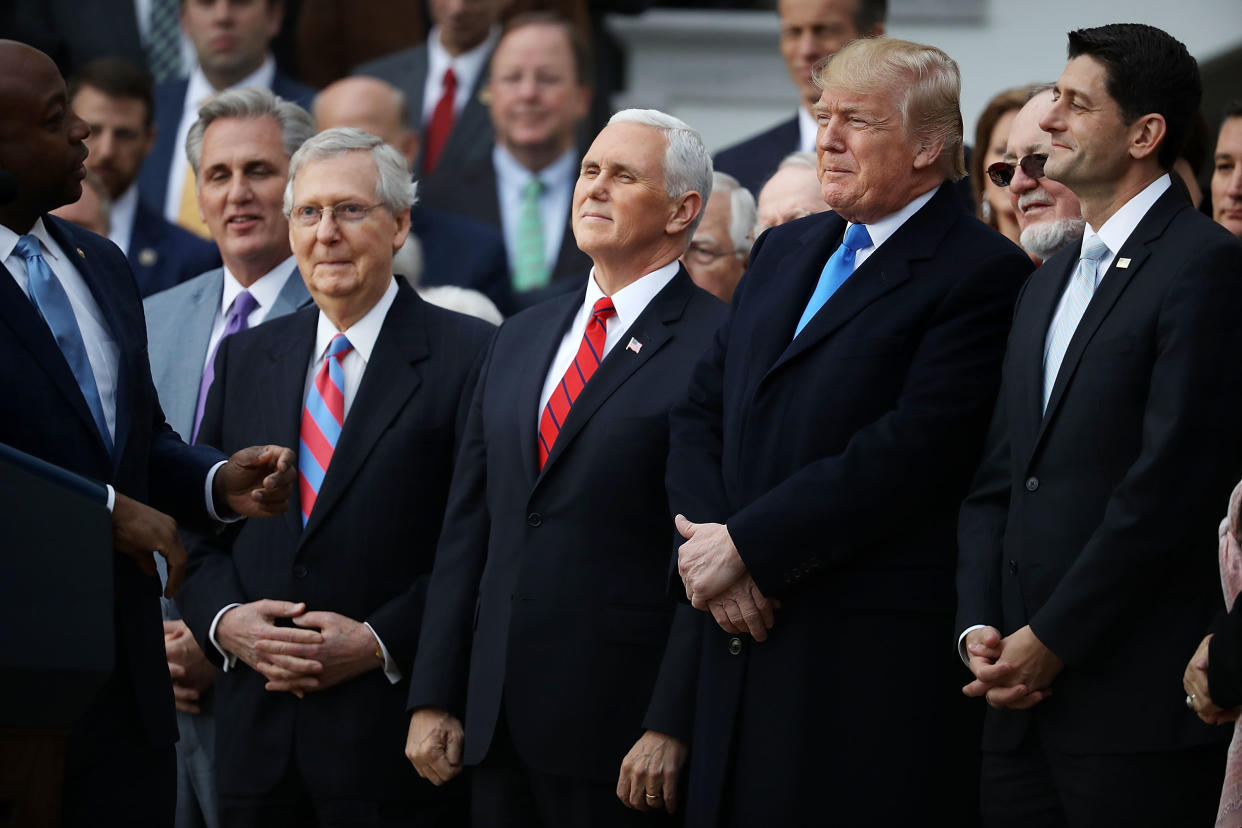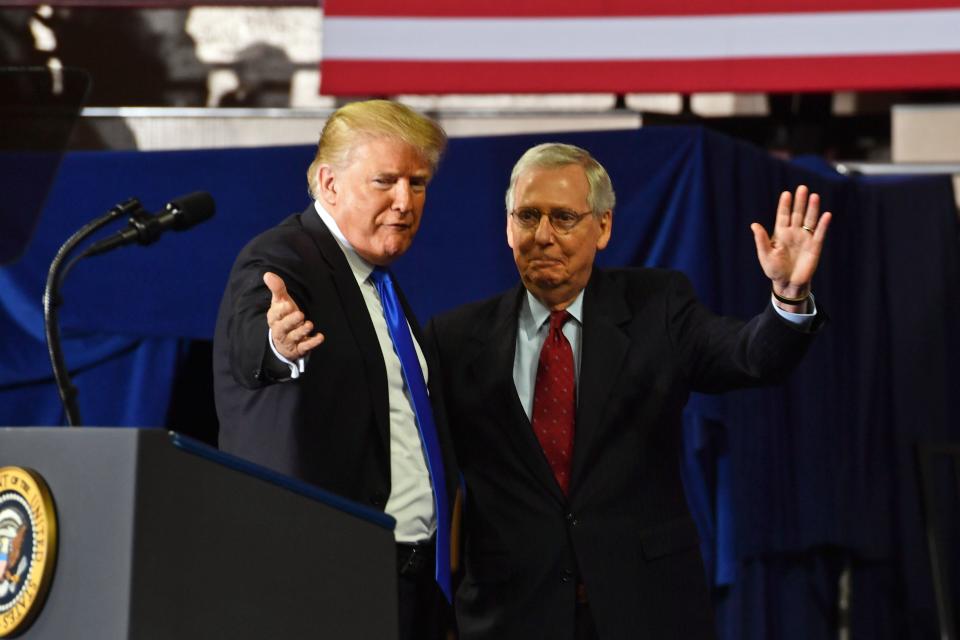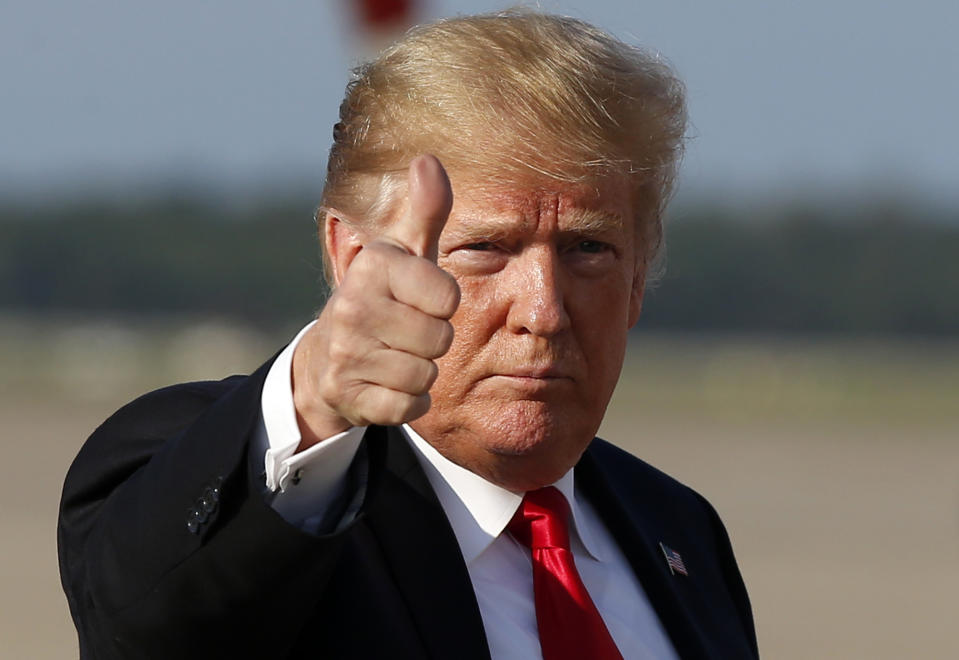What tax cut? Here’s what Trump and the GOP want to talk about instead

When Republicans in Washington passed their huge tax cut bill at the end of 2017, they expected it to be an issue they could ride to victory in the 2018 midterms.
“If we can’t sell this to the American people, we ought to go into another line of work,” said Senate Majority Leader Mitch McConnell in December shortly after the votes were cast.
“For members or anybody else who cares about keeping control of Congress, if you find yourself talking about anything but the middle-class tax cut, shut up and stop talking,” said Corry Bliss, who runs the Congressional Leadership Fund — a Republican super-PAC closely aligned with House Speaker Paul Ryan — in a February interview with the New York Times.
With less than two weeks until the midterm elections, Republicans from President Trump down are not talking about tax cuts and have been backing away from that message for months. A September poll by the Republican National Committee published by Bloomberg in September found that 61 percent of respondents said the law benefits “large corporations and rich Americans” rather than “middle-class families,” which corresponds with Wall Street Journal headlines like “Tax Change Helps Executives Afford Pricier Planes.”
A historically large number of Republican legislators have in fact decided to go into other lines of work. In lieu of lauding the tax cuts, Trump has turned to exaggeration and outright fabrication in his closing message, attempting to inflame xenophobia in his base while promising yet another tax cut — this one really, really targeting the middle class — but on a timetable that couldn’t possibly be met.
Trump, with some justification, points to the continuing strength of the economy and the job market as a success. And he boasts about getting Brett Kavanaugh seated on the Supreme Court, crediting his speech making fun of the woman who accused Kavanaugh of assaulting her. But he has all but stopped talking about some of his highly touted achievements, such as his opening strategy with North Korea, which he once suggested might be worthy of a Nobel Peace Prize.

But the primary thrust of the president’s midterm message has focused on an old standby — the demonization of minorities. Trump and right-wing news outlets have pushed to make a caravan of a few thousand Central Americans working their way toward the U.S. border the No. 1 story in the lead-up to the election. Trump has implied that the “assault” is part of a Democratic plot and is being funded by billionaire Democratic donor George Soros. Heightening the level of fear, Trump asserted that “unknown Middle Easterners” are in the group, although those covering the long march through Mexico cannot find any. The White House referred reporters to “Mexican authorities” when asked for specifics.
Trump has also cited Californians “rioting” over sanctuary cities (this is not happening anywhere) and claimed that Democrats want to give away cars to undocumented immigrants (not a policy proposed by any members of the Democratic caucus). He also told reporters this month that there isn’t a family separation problem at the border, because “people are grabbing children and they’re using children to come in to our country in many cases.”
Trump has also said that the migrants in the caravan would vote Democrat, reviving one of his favorite tropes — unsupported by any evidence and with multiple studies proving the contrary — about illegal voting. Last week, Trump said Democrats supported an “illegal immigration onslaught” because they “figure everybody coming in is going to vote Democrat.” Migrants seeking asylum along the border would not be able to vote on Nov. 6 — or for years thereafter, unless and until they become citizens.

On the economic policy front, Trump is eschewing a focus on the tax cut the GOP already passed (which primarily favored the wealthy) in lieu of pitching a fantastical middle-class tax cut that he said he planned to implement before Nov. 6.
“We’re putting in a resolution some time in the next week and a half to two weeks, [and] we’re giving a middle-income tax reduction of about 10 percent,” Trump told reporters at the White House on Monday. “This is not for business; this is for middle income, and that’s on top of the tax decrease that we’ve already given them.”
Congress is not in session and its members do not intend to return to Washington before the elections, and even if they did, the idea a bill could be drafted and passed in less than two weeks is divorced from reality. The White House now says the tax cut will pass after the elections, even though congressional leaders seemed to have no knowledge of the president’s proposal.
Trump has also addressed health care, the topic most important to a plurality of Americans voting in this election, according to one recent poll. The president’s main message is that Democrats will take away health care programs, insisting so in an op-ed published under the president’s name in USA Today that contained a falsehood in nearly every sentence. Trump is one of the many Republican candidates campaigning on keeping protections for Americans with pre-existing conditions even though the Obamacare repeal bill supported by the White House and most Republican legislators would have ended them, leaving many Americans with much higher health care costs or no plans at all. Trump’s messaging on health care has also been undercut by McConnell’s suggestion that Republicans would push for cuts to Medicare and Social Security if they maintain control of Congress.

_____
Read more Yahoo News midterms coverage:
Red-tide awakening: How Florida’s environmental woes could hurt Rick Scott
‘Outside agitators’ phrase resurfaces in Georgia governor’s race
In Texas Senate race, Betomania confronts Trump’s MAGA-rally for Cruz
In Senate race, GOP Rep. Blackburn accuses her opponent of being a Democrat
Photos: Honduran migrant caravan pushes north toward the U.S.



